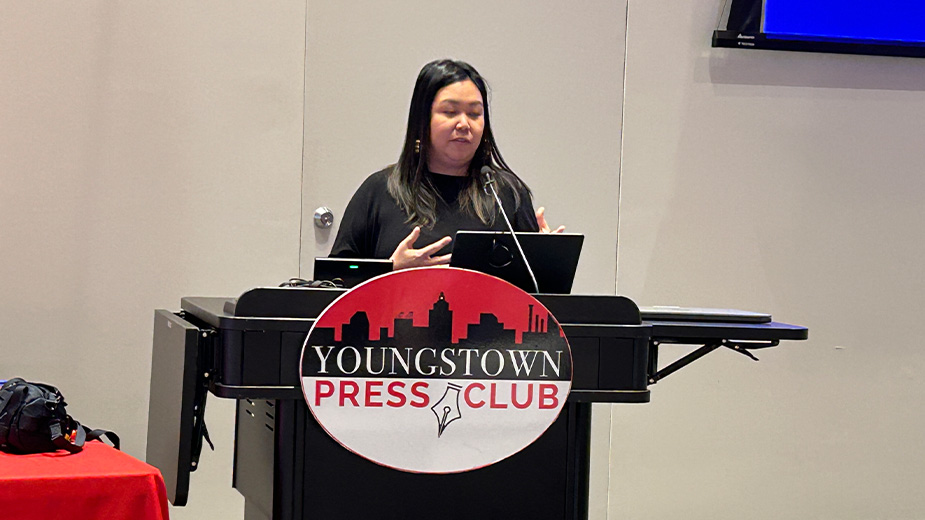Medical Marijuana Industry Rolls Out Carefully
EAST LIVERPOOL, Ohio — It’s a Tuesday afternoon and the door swings open into the waiting room at FRX Health on Dresden Avenue.
A man who appears to be in his early 50s enters and walks to a small counter, presents an identification card to the security attendant and is admitted through another door. Over about 10 minutes, six other patients walk in, all of them carrying registration credentials affirming they are approved by the state of Ohio to purchase medical marijuana.
“We had a really busy day last Friday,” observes Joe Jeffries, pharmacy director at FRX Health, the first medical-marijuana dispensary to open in Mahoning, Trumbull and Columbiana counties. “It was a record day.”
Retail sales of medical marijuana in the three-county region began Feb. 7 when FRX opened its doors, Jeffries says. Since then, one other dispensary – gLeaf in Warren – has begun operations. In all, the state has awarded 56 provisional licenses to dispensaries across Ohio, 18 of which have received a certificate of operation. Another dispensary, Quest Wellness of Youngstown, was awarded a provisional license and is awaiting its certificate.
Over the last four months, Jeffries says the overall number of patient registrations and physician recommendations is lower than what the industry had hoped for. “It’s about on par with Pennsylvania and where they were at this stage,” he says. “We hope to exceed that, but it’s not as much as we hoped.”
The latest data provided by the state show as of April 30, there were 31,075 patients with recommendations registered in the Ohio medical marijuana program. Of this number, 2,386 patients are veterans, 1,216 patients are indigent, while another 171 are diagnosed with a terminal illness.
The medical marijuana industry and market in Ohio has developed in a more measured course when compared to similar markets across the country. Of the 30 Level I and Level II cultivators awarded provisional licenses to grow medical marijuana, 17 have been awarded certificates of operation, while just three processors out of 39 licenses are certified.
Moreover, there are just three physicians in Columbiana County licensed to recommend medical marijuana for patients, Jeffries says. Of the 215 physicians registered with the state medical marijuana program, 18 are from in the three-county area.
Nationwide, medical marijuana is big business. In 2018, sales of medical cannabis stood at $4.5 billion across 33 states, according to Statista. By 2022, that number could climb to $7.3 billion.
Jeffries says getting processors up and running is essential to dispensaries, since these processors convert medical marijuana into retail products such as tinctures, oils and edibles. Two of these processors are now in business in Ohio, and he says that FRX can secure medical marijuana in these forms other than flower.
“At first, all we could get was flower from the cultivators,” he says. Flower is sold directly from the grow site to the dispensary and is administered through a small, handheld vaporizer. The vaporizer heats to about 390 degrees and the patient inhales the dosage.
“It was obvious early on that we needed to stock up on these vape pens,” Jeffries says. “We’ve sold hundreds of them.”
About a month ago, edible gummies started to appear in dispensaries across the state, Jeffries says. These types of products are essential to business since they provide patients with options. As an example, a patient who suffers from asthma or COPD probably wouldn’t want to inhale medical marijuana. However, a tincture or edible provides a viable alternative, he says.
Jeffries says business has grown by double digits every month since the dispensary opened. “The patient response has been great,” he notes, drawing in residents from Youngstown, Austintown, Boardman and much of Columbiana County.
Many of them have told the pharmacist that the use of medical marijuana has supplanted their use of prescription painkillers such as Percodan or anti-anxiety medications such as Xanax, Jeffries relates. “People genuinely have problems,” he says. “Pain is the most common. Some want to get off their opiates. And doctors can’t prescribe them anymore.”
The state has identified 21 medical conditions that qualify for treatment under the medical marijuana program. Among these are post-traumatic stress disorder, cancer, Parkinson’s disease, fibromyalgia, Crohn’s disease, glaucoma and ulcerative colitis.
PTSD, for example, is among the top-five conditions that patients at FRX Health use medical marijuana to treat, Jeffries says. “A lot of people who come back say it works.
Another thing is that they’re not looking over their shoulder all the time thinking that they’re doing something wrong. That alone relaxes them.”
Most of the patients who visit FRX are men and women 40 years of age or older, Jeffries says. Per Ohio law, each patient is limited to buying one-tenth of an ounce per day, or 2.8 grams, and limited as to how much they can purchase over 90 days. Veterans and those the state considers indigent receive discounts on registration fees, while most dispensaries advertise discounts on the products.
What is good news for consumers is that prices are easing a bit, Jeffries says. On average, patients could expect to pay $50 for 2.8 grams. “It’s come down about 10%,” he says. As more processors, cultivators and dispensaries open, the price should tumble even more over the next year, he says.
It’s important that patients interact with a pharmacist when buying the product, Jeffries emphasizes, since there could be adverse reactions to other drugs the patient might be taking. “One of the biggest is the blood thinner Coumadin,” he says. “It could make you bleed more.”
Jeffries, a third-generation pharmacist who for 15 years served as a pharmacy director at a hospital, says his company makes it a point to have knowledgeable professionals on staff to help patients. “How marijuana interacts with the body is intriguing,” he says. “We appreciate the doctors who recommend us and we can take it from there.”
FRX Health is just one aspect of what will become a vertically integrated operation that also includes a processor and cultivation site in East Liverpool, says Rebecca Myers, CEO and founder of FarmaceuticalRX, the parent of FRX Health.
“Ohio is really important to us,” Myers says. Not far from FRX Health at 2000 Harvey St., workers are demolishing part of an old building as renovations continue inside. The complex once housed a porcelain manufacturing operation that by the end of this year will be home to the FRX cultivation and processing complex.
The strategy is to control the process from seed to sale, Myers says, while simultaneously promoting economic development by advancing the science and biotechnology driving the industry today. “We think we are the only living-soil cultivator licensed in Ohio; so it’s essentially organic,” she notes.
Construction on the processing lab should be finished by the end of June, after which the company will ask the state for a certificate of operation and, it hopes, be running by August, Myers projects. Construction work on the growing operation should be finished by the end of this year.
“Part of our business model is to bring in a new industry where old industries have closed and bring in economic development and job creation,” she says. Once fully operational, the cultivation and processing complex would employ about 100 people.
FarmaceuticalRX also operates a cultivation site in Farrell, Pa. That operation should be harvesting its first crop in August.
“I’ve been really impressed with Ohio,” Myers says. In her eyes, the state has gone to great lengths to ensure that those operating in the industry follow through on what they promised in their applications. This disciplined approach may have led to delays in rolling out the program and its development, but ultimately improves the quality of the product for patients, she says. “We’ve noticed this right out of the box.”
Indeed, the state is especially picky when it comes to holding applicants accountable for what they’ve set forth on their applications, says Brian Kessler, chairman of Riviera Creek LLC, which operates a cultivation center along Crescent Street in Youngstown.
“There are some things that are taking some time,” Kessler notes. “It’s fair to say that it’s taking longer than we thought, but I think June is going to be an aggressive month.”
Kessler says patient counts continue to increase each month across the state. Among the reasons for the slow start is that there simply aren’t enough dispensaries and processors open to satisfy consumers. “Supply and demand is really weird,” he says, “but pricing is coming down for sure.”
As of June 1, the state recorded sales of $8.7 million on 1,075 pounds of medical marijuana. “In the last 30 days, 300 pounds were sold,” Kessler says, indicating demand is starting to accelerate and should continue through this month.
Kessler boasts that Riviera Creek has constructed a cultivation site that is “the most sophisticated in the world. The product is the highest quality in the state.”
About 70% of what Riviera Creek produces is considered premium medical marijuana that he says is in great demand.
“It sells out in 24 hours after we deliver it. People are happy with what we produce.” Another 30% of the company product is market price.
Riviera Creek harvested its first crop in February and has since doubled its growing capacity, Kessler says. “We’re about to start construction on more grow rooms and hired more personnel,” he says.
Riviera Creek employs about 30, excluding the 20 or so contractors working at the site. “We’ll be building for the next three years,” he says.
As the market in Ohio becomes more clear, so too will the business model for cultivators such as Riviera Creek. In about four months, Kessler says, the company should have new products on the shelves in the forms of tinctures, edibles and creams. “There’ll be a big bump by the fourth quarter,” he projects. “We think it will continue to grow, since it’s grown in other states.”
It’s also likely that the state will expand the number of medical conditions that could be treated with medical marijuana, thereby expanding the market, says Daniel Kessler, Riviera Creek president.
“The Ohio Board of Pharmacy has reached out to the public for recommendations,” he says. “They’re close to adding two more conditions – autism and anxiety.”
This year’s rollout is just the first phase of what Brian Kessler sees as a long commitment to a growing industry in the Mahoning Valley. “For us, it’s been exciting and demanding,” he says.
Copyright 2024 The Business Journal, Youngstown, Ohio.



